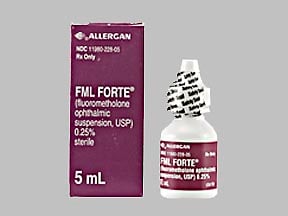
Fml Forte Coupons & Savings Card – Discount Prices from $330.64
My prescription
Edit
10ML of 0.25%, Fml Forte (1 Bottle)
Select pharmacy

CVS
$356.24
COUPON PRICE
Walmart
$330.64
COUPON PRICE
Albertsons
$336.87
COUPON PRICE
Walgreens
$341.63
COUPON PRICEFml Forte savings card
Show this card to your pharmacist
Walmart
$330.64
BIN
ID
PCN
GRP
019876
LHD8F25DFC
CHIPPO
LHX
Powered by
More prescriptions for eye inflammation
More prescriptions for eye inflammation
Price history for Fml Forte
1 Bottle, 10ML of 0.25%
Average retail price for Fml Forte
Average SaveHealth price for Fml Forte
Our price history data is based on aggregated prescription data collected from participating pharmacies in America. Our prescription data updates daily to reflect the latest price changes. If you notice a missing data point, it means there wasn't sufficient data available to generate a monetary value for that date.
*Retail prices are based on pharmacy claims data, and may not be accurate when we don't have enough claims.
Fml Forte dosage forms
Dosage Quantity Price from Per unit 10ML of 0.25% 1 Bottle $330.64 $330.64 10ML of 0.25% 2 Bottles $658.73 $329.37 10ML of 0.25% 3 Bottles $980.60 $326.87
| Dosage | Quantity | Price from | Per unit |
|---|---|---|---|
| 10ML of 0.25% | 1 Bottle | $330.64 | $330.64 |
| 10ML of 0.25% | 2 Bottles | $658.73 | $329.37 |
| 10ML of 0.25% | 3 Bottles | $980.60 | $326.87 |
What is FML FORTE used for?
FML FORTE is an ophthalmic corticosteroid used to treat inflammation of the eyes. It is commonly prescribed for conditions such as allergic conjunctivitis, keratitis, and post-operative inflammation.
What conditions does fluorometholone treat?
Fluorometholone is used to treat inflammation of the eyes. It is commonly prescribed for conditions such as allergic conjunctivitis, keratitis, and post-operative inflammation following eye surgery.
When should you not take fluorometholone?
Fluorometholone should not be used if a person has a viral, fungal, or bacterial infection of the eye that is not being treated. It is also contraindicated in individuals with a known hypersensitivity to fluorometholone or any of its components. Additionally, it should be used with caution in patients with glaucoma or a history of increased intraocular pressure. It is important to follow a healthcare provider's guidance regarding its use.
